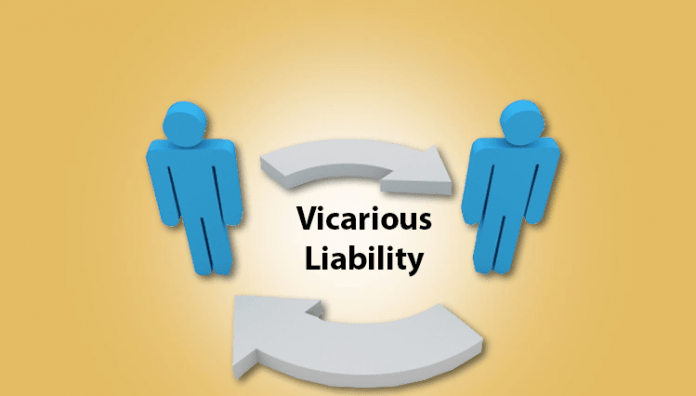Table of Contents
INTRODUCTION
Generally, a person is held liable for all the wrong actions he does and he does not incur any liability of act done by others. However, in certain cases, a person can be held liable for the art done by others. Like for instance, X is the driver who works for Y, Y asked X to go to the supermarket and bought certain things. While X was on his way to the supermarket he negligently banged the vehicle into Z, and he got injured. Although in this case Y was not driving the car still he will be liable for the accident caused to Z.
WHAT IS VICARIOUS LIABILITY
The concept of vicarious liability is when one person is being held liable for the act done by another person. The word ‘vicarious’ means – experiencing one act through another person and and ‘liability’ means – a state in which one person is being legally responsible.
INGREDIENTS OF VICARIOUS LIABILITY
There are a certain set of required ingredients to fulfill the concept of vicarious liability that are:
- There must be a certain kind of relationship between the wrong doer and the person held liable
- The wrongful act must be related to the relationship in a certain way
- The wrong committed should be within the course of employment
RELATIONSHIPS IN VICARIOUS LIABILITY ARISES
There are certain cases in which the vicarious liability arises:
- Master and servant
- Principal and agent
- Partners in a partnership firm
- Company and its directors
VICARIOUS LIABILITY OF MASTER FOR THE TORT DONE BY THE SERVANT
In the relationship of master and servant, the master employs the services of a servant, and the servant works according to the instructions, directions, and the commands given by the master. Master directly manages the actions of the servant. So in law it is to be deemed as the act done by the servant is done by the master himself, so he is liable for the same. Even if the act was done by the servant is done by using unlawful means the master still will be held liable. The doctrine of the liability of master-servant relationship is based on two Latin terms namely:
- Respondeat superior – this means ‘let the principle be liable’ and puts the master responsible for the committed act
- Qui facit per alium facit per se – this means ‘he who does the act through another is deemed in law to do it himself’ so the act of servant is the act of master. Even if the negligence is done on the part of the servant, the master will be liable.
Independent contractors are not servants, in the case of servant there is a contract of service that is the master has the right to instruct the servants as to what tasks are to be done and in what manner, whereas in the case of an independent contractor is there is a contract for service that is the person is instructed as to what is to be done and then the things are left up to him and he could do them according to his will. The person for the contractor is working will not be held liable for the actions of the independent contractor.
AGENT AND PRINCIPAL
The relationship of principal and agent is an association in which the principal legally appoints agent on behalf of himself. The agent is authorised to do the act given by his principal and the principal is liable for all the acts of the agent.
PARTNERS IN PARTNERSHIP FIRM
The relationship between the partnership is similar to that existing between a principal and an agent. All the partners are jointly responsible for the actions of the other partners in the partnership firm. If the tort committed by any partner in the ordinary course of the business of the firm, all the other partners are liable to the same extent as the guilty partner. According to section 25 of The Partnership act – ‘Every partner is liable jointly with all the other partners and also severally for all the acts of the firm done while he is a partner’.
REASON FOR VICARIOUS LIABILITY
There are some reasons for making this principle, such as:
- As masters are having a better financial position and are competent enough to take the charge as when compared to the servant
- The act done by the servant is considered to be done by the master
- The acts done by the servant makes a profit to the master then he is benefited so if any act done by the servant causes any loss to the master he is held responsible
TEST FOR THE DETECTION OF THE RELATIONSHIP
- Hire and fire test: As per this, the master pays to the servant and also master has the power to dismiss the servant
- Direction and control test: As per this, the master is entitled to give binding orders to the servant and he has to follow the same.
CONCLUSION
Under vicarious liability, a person is held liable for the tort committed by another. The act done by the servant is to be done under the course of employment for the master to be held responsible. The act is deemed to be done by the master himself. There are several tests for the determination of the relationship between the master and the servant also the courts apply its discretion to determine the relationship.
Author: Nishtha .,
Trinity institute of professional studies

